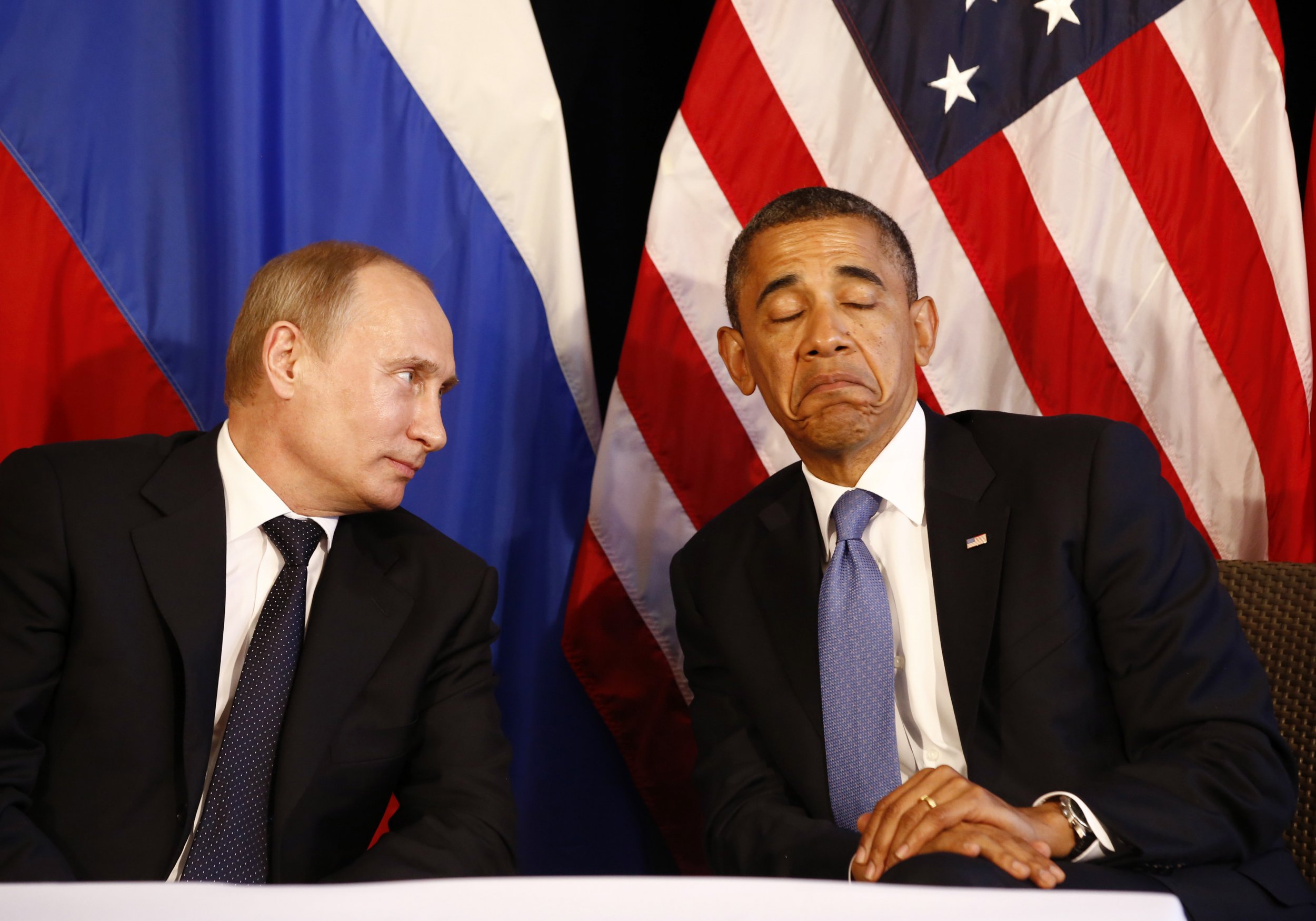
The resistance movement against President Donald Trump and his Republican allies has increasingly pinned its hopes on the Russia investigations. If these probes are the panaceas many believe, they will not only remove Trump from office but also restore some decorum and decency to our politics.
But while Moscow clearly meddled in our election—whether by hacking Hillary Clinton's emails or collaborating with the Trump campaign—blaming the Kremlin for destroying our democracy absolves those who broke it long before November.
Trump's lie that millions of illegal immigrants voted in the election is only the most recent and public effort to thwart majority rule. As that majority has become younger and browner, a core group of conservatives has done everything in its power to stop them from heading to the polls.
Indeed, small "d" democracy has been under siege for decades. Vladimir Putin and company just dropped in to pick over the bones.
Here's how it happened.

THE CONSTITUTION
Some of this un-democracy is built into the Constitution. The Electoral College enabled Trump to win the 2016 election with 3 million fewer votes than Clinton received. And because the small states demanded equal representation in the Senate as a condition of signing onto the Constitution, we have a system under which a majority of Americans live in nine states but that majority has only 18 votes in the Senate, while the minority has 82.
Californians now have one-sixth the amount of representation in the Senate as people who live in Wyoming, according to calculations by journalist Zachary Roth, author of The Great Suppression: Voting Rights, Corporate Cash, and the Conservative Assault on Democracy. This imbalance has a racial component too: Nonwhites make up 44 percent of the 10 largest states but 18 percent of the smaller ones.
GERRYMANDERING
After the election of Barack Obama, the Republican State Leadership Council began plotting to elect GOP lawmakers to state-level offices to control the redistricting process. When the Republicans won those legislatures in 2010, they also won the right to rejigger congressional boundaries in their favor. The following year, they redrew twisted district lines across the nation, all but guaranteeing GOP control of the U.S. House of Representatives until the next redistricting process, in 2021. The gambit was audacious, and though the Democrats have gerrymandered in the past, the scale of the 2011 effort was like nothing seen before in this country.
VOTER SUPPRESSION
As Roth explains, Republicans have also tried to suppress the vote. Their targets: poor people and nonwhites, who are more likely to live in areas where voting facilities are not well maintained or are difficult to get to. Republicans in control of states such as Wisconsin, Ohio, Florida, Kansas and North Carolina have purged voters who have changed residencies or have failed to vote in previous elections, according to the Center for Public Integrity.
The head of Trump's commission to investigate voter fraud, Kansas Secretary of State Kris Kobach, has been battling the American Civil Liberties Union over his state's requirement that voters show birth certificates or passports to register. The young and poor are less likely to have easy access to such documents, or to have photo IDs. The powerful American Legislative Exchange Council (ALEC), which receives significant funding from billionaire conservatives, as well as oil, gas, tobacco and telecom corporations, has provided cookie-cutter voter ID laws to state legislators for sponsorship.
THE COURTS
In 2013, the U.S. Supreme Court decided that states no longer have to submit to federal oversight or "pre-clearance" of changes when they want to modify voting laws. The clearance requirement had been law since the 1960s and was designed to assert federal control over Southern states that were trying to suppress the black vote. The decision in this case, brought by an Alabama county, now effectively allows states to alter their voting requirements in ways that disenfranchise potential nonwhite voters.
PRE-EMPTION

When the right gained control of state legislatures, progressives turned to local governments to pass restrictions—for instance, on smoking indoors or polluting local water supplies. There, too, some on the right have squashed democracy, by devising and advocating for pre-emption laws that forbid locals from passing their own legislation. Communities in Oklahoma and Texas that tried to ban fracking, for example, have been forced to give up after state lawmakers prohibited those bans.
Wisconsin turned into a "pre-emption hot spot" according to Roth, in part because Governor Scott Walker—a recipient of major funds from Charles and David Koch, the right-wing billionaire activists—was trying to crush local government unions. Now industry lobbyists find it easier to manipulate state legislatures that have passed bans on everything from community public health rules to local regulations on Uber.
DARK MONEY
Decades ago, a small group of right-wingers with billions of dollars in disposable income banded together to wrest power away from the rabble. With a president and a House of Representatives in thrall to a minority of the population, they have succeeded.
Related: Russian hackers attacked the 2008 Obama campaign
After Obama's victory in the 2008 election, these men, led by the Koch brothers, feared socialism was on the horizon and ratcheted up their efforts. Creating the anti-government, anti-tax Tea Party to win the House in 2010 was only part of the plan. The Supreme Court's Citizens United ruling that same year amplified their efforts, allowing untold amounts of so-called dark money to flow into new corners of American politics.
The libertarian Koch brothers were reportedly unhappy with the candidacy of Trump, whose allegiance to conservative principles was still in doubt. But by spending nearly a billion dollars on lower races in the 2016 election, they were also aiding the man at the top of the ticket by bringing more Republican voters to the polls.
This year, they have been more muted on Trump. And why not? The president's disdain for government, his desire to slash regulations and lower taxes, is a Koch brothers dream. They're probably happy with the way things have turned out. But when you have endless amounts of money, it is always possible to be a little happier.
TRYING TO AMEND THE CONSTITUTION
Many conservatives profess a deep love for liberty and the Constitution. They use it in rhetoric. They apply it in legal theories to crush liberal economic policies, roll back modern attitudes toward women and minorities and ignore multicultural demographic realities.
But some on the right also want to rewrite the great document. The Kochs, along with other billionaires and their big corporate allies, have been bankrolling a move to hold a convention to amend the Constitution and write a Balanced Budget Amendment into it.
The Kochs and their Balanced Budget Amendment Task Force have been pushing for the amendment since 1995. ALEC, their right-wing legislative policy farm, has a model law that the states have been passing. The Balanced Budget Amendment would, of course, give wealthy people and corporations another tool with which to pay fewer taxes or resist financing projects, like publicly funded or subsidized health care.
Under Article V of the Constitution, amendments can be proposed either by two-thirds of both the House and Senate or through a convention called for by two-thirds of state legislatures, which would be 34 states. Then 38 states would have to ratify it before it could become part of the Constitution.
Twenty-seven states have passed the call for a constitutional convention to consider the Balanced Budget Amendment. In response to the movement, more than 200 organizations opposed to the amendment signed a letter in April denouncing an Article V convention at this time as "a dangerous threat to the U.S. Constitution, our democracy, and our civil rights and liberties." But the groups behind the convention drive are focused on getting support from at least seven more states is 2018 (Kentucky, Maine, Minnesota, Montana, South Carolina, Virginia and Washington).
The Kochs and ALEC are behind an even more radical effort as well. The Convention of States Project, run by the Texas-based Citizens for Self-Governance, is pushing for a convention to drastically restrict the powers of the federal government to tax, regulate and make decisions that apply to individual states. Last election, they introduced their bid in 24 states. Arizona, Missouri, North Dakota and Texas passed it.
THE RESISTANCE

As a committed core of conservatives have been fighting against small "d" democracy, progressives and Democrats have lacked the ability—or the imagination—to fight back. In one of his last interviews in the White House, Obama acknowledged his role in this failure. "Some of this was circumstances," he told ABC News. "But I think that what is also true is that partly because my docket was really full here—so I couldn't be both chief organizer of the Democratic Party and function as commander in chief and president of the United States—we did not begin what I think needs to happen over the long haul, and that is rebuild the Democratic Party at the ground level."
Obama and former Attorney General Eric Holder created the National Democratic Redistricting Committee last year to coordinate campaign strategy, direct fundraising, organize ballot initiatives and put together legal challenges to state redistricting maps. Holder has joked, "Part of my job is to make redistricting sexy" for Democrats.
Beside that effort, the Supreme Court just accepted a challenge to Republican gerrymandering in Wisconsin. The court last dealt with the issue in 2004, but the current case, which it will hear in the fall and rule on before the 2018 election, proposes a different framework. Plaintiffs are basing their challenge on new political science that uses voting data to assess bias against one party or another in the maps.
The Great Suppression author Roth says all the Republican-backed voting restrictions "definitely played a role in the election," but he doesn't think that completely absolves the Russians, who hacked into and possibly disseminated politically damaging email correspondence from the Democratic National Committee. For example, Wisconsin's voter ID law gave Trump an advantage in the Cheese State, but Clinton also lost Pennsylvania and Michigan, where voter suppression shenanigans were less of a factor.
After the Democratic loss in Georgia's 6th Congressional District on June 20, some Democrats began noticing that the Russia probes won't guarantee success in 2018. The day after the vote, New York Representative Joseph Crowley, the chairman of the House Democratic Caucus, told colleagues during a private meeting that voters in the midterm elections will be more concerned about domestic issues than the Trump-Russia investigation.
"The shiny object which is Russia and the Trump administration is in many ways a smokescreen for Mitch McConnell and the Senate to do things they probably wouldn't be able to get away with if the public and media were paying more attention," Crowley later told reporters. "We're all guilty of that to some degree."
Uncommon Knowledge
Newsweek is committed to challenging conventional wisdom and finding connections in the search for common ground.
Newsweek is committed to challenging conventional wisdom and finding connections in the search for common ground.
About the writer
Nina Burleigh is Newsweek's National Politics Correspondent. She is an award-winning journalist and the author of six books. Her last ... Read more





